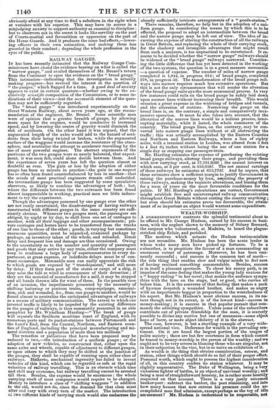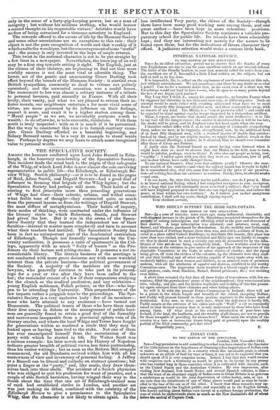WEALTH-WORSHIP.
A CORRESPONDENT contrasts the splendid testimonial about to be offered to Mr. George Hudson, earned by his success in busi- ness, with the neglect shown to the memory of Sidney Bernard, the surgeon who volunteered, at Madeira, to board the plague- stricken ship Eclair, and perished. The motives which actuate the Hudson testimonialists are not recondite. Mr. Hudson has been the acute leader in whose wake many men have picked up fortunes. To be a subscriber, is to propitiate the favour of a man commanding an enormous extent of patronage. Moreover, he has been emi- nently successful ; and success is the common test of merit—. the sole thing that enables slow and vulgar minds to feel sure of having realized something commendable. Besides, success is in itself a pleasant spectacle. To cheer his sunny path, is an impulse of the same feeling that makes the young lady anxious for a" happy ending " in her novel ; that makes the audience sympa- thize with the hero on the stage, bad or good, who carries all before him. It is the converse of that feeling that makes a pack of hycenas despatch a wounded brother, and makes us angry with an importunate beggar in proportion to the wretchedness of his aspect. But Mr. Hudson's most obvious success, in its na- ture though not in its extent, is of the lowest kind—success in money-making; it is success in that popular pursuit that com- mands the admiring sympathies. Unless some of the subscribers contribute out of private friendship for the man, it is scarcely possible to divine any motive but one of meanness—some abject hope of lucre, or more abject idolatry of it in the abstract. The case, however, is but a startling example of a very wide- spread national vice. Deference for wealth is the pervading sen- timent. On it are based the largest portion of the usages of polite society ; there are but few courtesies in form which cannot be traced to money-worship in the person of the wealthy ; and we ought not to be very severe in blaming those who are singular, not in their subjection to the vice, but in so naïve an exhibition of it. As wealth is the thing that obtains consideration, esteem, and station, other things which should do so fail of their proper effect. Personal worth, which ought to possess the highest consideration of all, in this country confers no station whatever. It may be slightly augmentative. The Duke of Wellington, being a very victorious fighter of battles, is an object of universal worship ; and being a man of straightforward honesty, he is rather more heartily respected on that account. There is a very justly esteemed banker-poet : subtract the banker, the poet remaining, and into how many houses that now entreat his presence could the ac- complished man find admission, except perhaps as the toy of idle amusement Mr. Hudson is understood to be respectable, not
only in the sense of a forty-gig-keeping power, but as a man of integrity ; but without his millions sterling, who would bestow a second thought on his respectable 'virtues? Aristides would have no fear of being ostracized for a tiresome notoriety in England. The rewards offered to the savers of life by the Humane Society and some other associations are no exceptions to this rule : their object is not the pure recognition of worth and that worship of it which exalts the worshiper, but the encouragement of some "useful" end : the money is only invested in the hope of ample returns.
This twist in the national character is not to be put straight by a few lines in a newspaper. Nevertheless, the knowing of an evil may be a first step towards setting it right. The English, just at the climax of their idolatry, are beginning to find out that mere worldly success is not the most vital or adorable thing. The heroic act of the gentle and unassuming Grace Darling took effect beyond the bounds of the Humane Society : it startled even British sympathies, commonly so dead to virtues not politely varnished; and the unwonted sensation was a useful lesson. The monument to her was almost a solitary instance of a tribute to personal heroism, paid annually in France. With all their levity, their vanity, and what we are pleased to esteem their in- ferior morals, our neighbours entertain a far more vivid sense of virtue, are more governed by its influence on their feelings, respect it more, and exalt it to a higher station among them. "Moral people" as we are, we invariably- postpone worth to wealth : to do otherwise, is to be eccentric, ridiculous. With them merit is truly respected : with us it is much if it be patronized. But the way to counteract this vice is to furnish contrary exam- ples. Grace Darling afforded us a beautiful beginning, and Sidney Bernard seems to be a very fit example to stand beside her. Perhaps by degrees we may learn to attach some recognized value to personal worth.



























 Previous page
Previous page